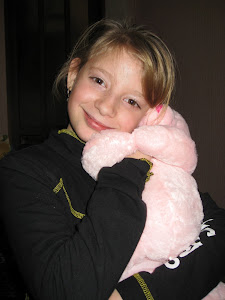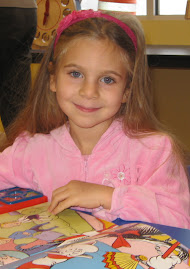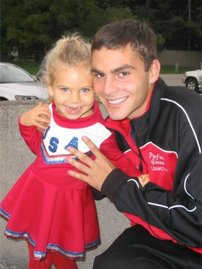We’ve been home for 2 months now, and it already feels like Rachel’s been in our family forever. She’s such a sweet little girl, very well behaved, trying to please us, always doing what she’s asked to do, etc. She and Victoria are a very good friends even though there is a healthy sibling rivalry between them :) Lately they started bickering a little bit more than before, but I think this is very normal after their “honeymoon period” has ended. There is still some jealousy between the girls in regards to the attention they are getting from Oleg and I (especially from Rachel, which is expected). We are trying very hard to spend an equal amount of time with both girls, and I think we are doing very good.
Rachel started gymnastics a couple weeks ago, and she loves it! She also started ballroom dancing lessons! Our local “Fred Astaire Ballroom Dance Studio” has a spring session for 4th-graders at our elementary school, and Rachel is a natural! Ballroom Dance is my weakness – I used to dance back in Ukraine, and Alex took several years of Ballroom Dancing as well, so my goal now is to find partners for both girls and start the formal lessons ASAP :)
Now that Rachel is getting more comfortable with her new life in America, I’d love her to find friends her age, but it’s not an easy task because her English is almost non-existent. One would argue that it’s because of the fact that we speak Russian at home, and I agree. According to Dr. Gindis, the leading expert in international adoption, a second language is usually acquired based on two models: "additive" and "subtractive". Internationally adopted children replace their first language by a new language, it’s a subtractive model, and the immigrants learn a new language in addition to their native language, which is an additive model. Since Rachel is speaking Russian at home, she acquires English by an “additive” model, and her language acquisition is supposed to be slower. But we’ve been through this before! Oleg, Alex and I started learning English virtually from scratch. All our friends came to the country not speaking any English and were able to learn it and go on to receive BS and even MS degrees. The process to learn English in immigrant families is usually the following: start with learning some basic vocabulary, then able to translate simple written English sentences into Russian, then being able to build simple English sentences, then start understanding native English speakers, and then finally start speaking. After this stage many kids (depending on age) usually stop speaking Russian, but still understand it, so when their parents ask them something in Russian, they reply in English.
After 2 months we see some progress with English, but it is VERY tiny. Oleg and I even decided to speak to her in English, but it doesn’t work! She starts crying when she doesn’t understand us! So what’s more important for us – her language development or her happiness? Of course her happiness! Yes, she’s very behind, yes, it takes her more time to memorize things, but hey – she has all time in the world to catch up. We are working very hard tutoring her, and I’m sure she’ll get there, even it will be later then we we’d want her to.
She still loves school :) Her teachers are AWESOME! I had a parent-teacher conference last week, and even though her academic progress is not as fast, her social progress is much better! She’s trying to communicate with other kids at school, which is a huge plus with her lack of language, and she seems much more comfortable in the classroom. She’ll probably repeat 4th grade with the same teacher, and hopefully by the end of next school year we’ll see more results.
Though I’m a little bit disappointed with her slow progress, it’s something that was expected. The post-institutionalized children are usually developmentally behind because they didn’t have a chance to be nurtured and educated by their parents. Of course a child whose parents started reading to him from birth, and a child who never had an individual attention, will have different results. I firmly believe that parents play a huge role in their child’s academic progress. It’s a parents’ job to prepare the children for school, to tutor them as needed, etc. Though all children have different abilities, I can say from my teaching experience that the kids whose parents work with them at home usually are better students.
Speaking of students, I recently connected with my former students in Ukraine! There is a new social-networking website http://www.odnoklassniki.ru/, where I found my old friends, classmates, neighbors, and even students! I used to teach Math for 6th – 9th graders, and imagine my surprise when I received a message from one of my former students! Then another, and another, and now I’m in contact with many of them! I only taught them for 3 years, but they still remember me! It was so nice to hear that I was their favorite teacher :) These “kids” are now almost 30 years old, married with their own kids, and it’s so strange when they address me formally with my patronymic name: “Nataliya Vitalievna”!
Anyway, back to my thoughts about parents working with their kids. I taught Alex to read by 4 years old, and I felt guilty that Victoria still didn’t read at 5. She recognized alphabet since 23 months old, she was doing “Color by number” and “Connect the dots” activities by 3 years old, etc., but I didn’t know how to teach her to read in English. Well, I’m happy to report that she’s reading now! These tutoring sessions with both Rachel and Victoria were good enough to get her started! Yesterday she even took one of the books to preschool and read a story to her class. The kids were very impressed :)
My other “baby” Alex doesn’t need my tutoring anymore, and even if he needed it, I wouldn’t be able to help him. Last semester he took a “Differential Equations” class, and even though I wrote my Master’s thesis in Differential Equations many years ago, I don’t remember ANYTHING :) His program requires several co-op blocks as a part of curriculum, and he’s looking for a job now. So if any of you are hiring a computer engineering/computer science/information technology intern, please let me know! Yesterday he attended a huge student job fair, and it was so neat to see him in suit and tie – he looked like a real professional!
We still didn’t have a chance to take a new family portrait, but I’m working on the plan to get everyone together for a photo session :)
Subscribe to:
Post Comments (Atom)







10 comments:
2 months sure does go by quickly. How nice that the girls are doing so well together.
Regarding the language: sounds like she is very lucky to have an excellent tutor for a mother, I'm sure she'll catch up. Have you tried speaking to her first in English, then repeating what you said in Russian? That is the method that many adoptive (non-Russian speaking) parents use with "older" adopted kids. We study basic communicative Russian as much as possible before the child comes home, then speak to the child always first in English, but then follow-up with explanation/repeat as best we can in our elementary Russian (usually combined with pantomine!) I'm thinking the same thing would work in your case, only obviously, your Russian follow-up would be much better! And of course, since she doesn't need to acquire the English to "survive" (as most adoptees do) obviously her acquisition will still be slower.
I was really interested to hear your explanation of the immigrant child learning English. We are lucky to have some Russian friends, and we have a tutor for Katya, so we have really worked to keep her Russian (trying for the additive model!). At one year home, she understands everything in Russian, but almost always answers in English when addressed in Russian. I took that to mean we weren't doing enough to keep the Russian, but since this seems to be the natural process even in the Russian speaking home, I suppose we are doing the best we can, so that was encouraging to read.
Has it really been two months since we saw each other on the corner of Boonina and Kateriskya?! I can't believe it!
I'm so glad Rachel is doing well with her social adjustment. Your patience in teaching her English will be rewarded. She's a smart kid. She'll learn...and the added bonus is she'll have the Russian language retention as well. I'm jealous! I wish I could have done that for our four kids. ((hugs))
Wow, 2 months already? Rachel will be speaking English before you know it. Around 7 (I think) months my girls just switched from speaking Russian one day to speaking English, or so it seemed.
It's amazing how fast the time goes, isn't it?
Rachel sounds like she is doing wonderfully. And while I understand your desire for her to speak English, I think your focus on her happiness is the right priority. The language will naturally come.
I'm so happy things are going so well for your family!
If she takes a little longer than you'd hoped for her English, so be it. I think it's wonderful that you keep up the Russian so she won't lose it as that would be a shame.
Does she watch any TV or DVD's? I'm not pushing sitting in front of the TV for extended periods of time but if she wants a bit here and there, she'll catch on from the actions. Once she is around the children at school longer, that will also help her.
When Tamara and Chris moved over to Moscow with their family, Katya was turning 4 and went to an all Russian preschool and was the only non-Russian child. It must have been terribly hard for her but she really picked it up with months and has perfect Russian for a long time. Rachel will do the same.
It's wonderful that you are trained as a teacher as that is benefitting both of your girls.
Can't believe how the time has flown by since I was reading your blog while you were preparing to go over the first time.
I actually have a degree in Speech and Hearing. It is okay that you speak Russian. Children actually learn from the environment over the household. That is why say a child whose family comes from Vietnam for example will speak fluent Vietnamese, in the home yet still speak English fluently.
For example my brother has lived for almost nine years in Germany. His children can speak German very well, but at the same time speak perfect English. Their peers are in an English school so they are school exposed to English and not German. So they remain English first speakers.
You learn from your environment around you, so since her peers speak English and the TV for example is in English, that is what she will learn. She will still be fluent in Russian and that is okay but she will learn English as time goes on. Have you joined the older kids adoption group? If not contact me and I can get you in touch with the moderators.
Another thing I might mention. My good good friends adopted a 12 year old and three other older children. All have lost their Russian but not their accent and they have been here for almost seven years.
My email is boomerseyler@yahoo.com
Leanna
Thank you for all this great information. It is fascinating how language works as I'm noticing that Galyna has a very hard time speaking Russian now - after only nine months at home! I hope we can preserve this, but I see it's going to be difficult, as she also is going through a phase where she doesn't want anything to do with her "heritage."
How awesome that Rachel will become bi-lingual and be a wiz at Math! She'll be equipped to be very successful with those skills.
It is wonderful to see how well the transition is going - I can't believe you've been back two months!
I thought I commented on this post, but apparently, I didn't!
I agree that for now, the best is for Rachel to comfortably adjust! Of course! Good for you and your wise parenting! She will learn soon enough.
I, too, am interested about the additive and subtractive models of language acquisition! We are hoping to preserve the boys' Russian and this gives us a better idea for our plans.
Of course, they converse amongst themselves in Russian but they are already forgetting some words. I am sure they would remember if reminded but when asked, they sometimes have forgotten. Words like "boat" and "apple" are the ones we have noticed this week.
I am glad things are going so well for you all! Congratulations for arriving at the two-month-mark so gracefully!
2 months...WOW...I can't believe that! I can imagine that with you speaking Russian at home that English will be much slower for her. Fortunately though, you are the walking/talking dictionary for her. We on the other hand think that our girls are understanding everything and often have to stop and ask them if they know what we are saying and then try and explain those words that we take for granted every day.
I am so happy that things are going well for you all. God Bless!
Rachel will learn English in her own time. I also feel it is better for her to be happy. When she doesn't understand and starts crying, that is difficult. She is still adjusting (and she is adjusting VERY well), but she needs time. She has so much time to learn English and it is awesome that she will be bi-lingual. I am trying to learn Russian so any tips will be greatly appreciated. :o)
Post a Comment